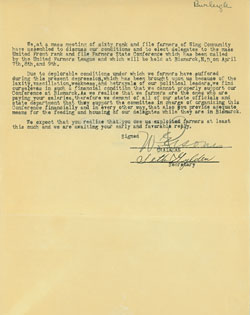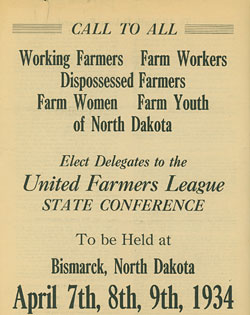We’ve launched a new web portal! Visit findhistory.nd.gov to search our collections.
Due to a road closure, the Killdeer Mountain Battlefield State Historic Site is temporarily closed.
In late March, 1934, State Librarian Lillian Cook received ten letters, some typed, some handwritten in pencil or ink, from farmers in different communities around western North Dakota demanding that she support, with money and other resources, the farmers coming to Bismarck on April 7th to attend the state conference of the United Farmers League. Ms. Cook saved the letters and a bulletin issued about the conference, and gave the file to the State Historical Society of North Dakota. Perhaps she understood the historical significance of the great drought and economic depression that had gripped the nation and hit the northern plains very hard.
The United Farmers League (UFL) interfered with forced farm foreclosures by preventing the sheriff from conducting the sale. They also attended foreclosure sales and by pre-arranged plan each would bid a penny for an item, forcing the sale to end with the farmer still in possession of his machinery and land. The UFL was a communist-led organization, meaning that while most of the members were probably not communists, their leaders were, and the rhetoric of their letters reflects their philosophy. The League conducted state-wide meetings in 1932, 1933, and 1934. They asked for three things as they explained in their program for 1934:
Shortly after the 1934 meeting, the United Farmers League weakened and disappeared. Many of its members would become associated with the Farm Holiday movement; others would just attend to their farming, such as it was during these years.


These letters, one of which is reproduced here along with a notice of the meeting, are important indicators of the desperation that farmers felt as they watched their crops wither from lack of rain, as they failed to provide their families with an adequate income, and as they as they lost their farms and homes.
Mss 20639
Address:
612 East Boulevard Ave.
Bismarck, North Dakota 58505
Get Directions
Hours:
State Museum and Store: 8 a.m. - 5 p.m. M-F; Sat. & Sun. 10 a.m. - 5 p.m.
We are closed New Year's Day, Easter, Thanksgiving Day, and Christmas Day. We are closed at noon Christmas Eve if it falls on Mon.-Thurs. and are closed all day if it falls on Fri.-Sun.
State Archives: 8 a.m. - 4:30 p.m. M-F, except state holidays; 2nd Sat. of each month, 10 a.m. - 4:30 p.m. Appointments are recommended. To schedule an appointment, please contact us at 701.328.2091 or archives@nd.gov.
State Historical Society offices: 8 a.m. - 5 p.m. M-F, except state holidays.
Contact Us:
phone: 701.328.2666
email: history@nd.gov
Social Media:
See all social media accounts